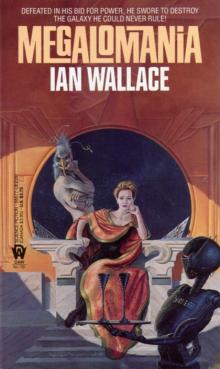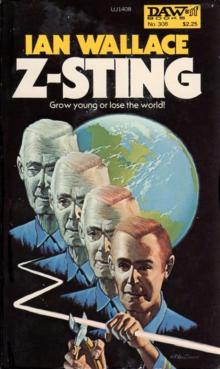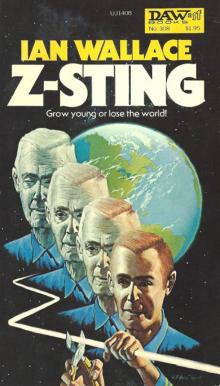- Home
- Ian Wallace
Z-Sting (2475 CE)
Z-Sting (2475 CE) Read online
IAN WALLACE
Croyd brought peace to a warring world by means of his Comcord system. When a nation's discord quotient rose to the boiling point, Comcord would trigger the ultimate peace weapon called Z-sting.
Z-sting would encapsulate the war-seeking nation, cutting it off totally from the world and from civilization. Comcord worked and peace had reigned for a century—until an inexplicable rise in militarism blew the terror whistle.
It was up to Croyd who had created the system to find out what had gone wrong, but Croyd was by then a very ancient old man. Aided by his great-granddaughter, he undertook to prevent the Z-sting trigger from being falsely activated. To achieve this, they had to:
Bring Croyd back his youth and vigor.
Uncover the motive behind the war crisis.
Find the trigger—hidden at the edge of the Solar System.
The resultant novel is a vibrant and complex work of science fiction comparable to Ian Wallace's other great novels such as THE WORLD ASUNDER, DR. ORPHEUS, and A VOYAGE TO DARI.
AFTER WAR, WHAT?
“To eliminate weapons is to vitiate Man. He finds his fulfillment ultimately in the creation and deployment of glittering technological terminators. A weapon-conquest is psychologically more soul-satisfying than a sexual conquest: it is the latter that is a pale symbolization. Should Man ultimately terminate himself with weapons, this will have proved to have been his artistic destiny. He may, of course, bring it off by mistake; but if he does, the error will be Freudian. After All, the ultimate One; after millennia of disparate vegetative growth, human coda to a mighty God-fugue.”
—Karl Karth,
Homo Schopenhauer (2362)
Copyright ©, 1978, by Ian Wallace.
Cover art by H. R. Van Dongen.
To ALEXANDRE DUMAS père
with other prime movers
replacing amour and gloire
FIRST PRINTING, OCTOBER 1978
PROLOGUE
When Marta Evans greeted Mayday 2475 she had every reason to anticipate a gay May as long-established top bitch of Erthworld and presumptive chief of the forthcoming Interplanetary Union. It was a super-comfortable state of affairs for a virtual virgin in her eighties who had dedicated her life to the accumulation and manipulation of power.
Marta didn’t often take time to reflect that her power depended on an automated balance of Erthworld international powers, an automation called COMCORD, which had been set up by her great-grandfather almost a century earlier. Not often did she give thought to the almost inconceivable possibility that the COMCORD balance might someday fail, with a hideous outcome; this possibility was pure fantasy, her great-grandfather Thoth Evans had planned and executed too thoroughly well with COMCORD. On COMCORD’s eternal interpower balance Marta Evans could thoroughly rely; and so could all the peoples everywhere on Erth; and when, very soon, Marta would become leader of the Interplanetary Union, she would see to it that COMCORD would be extended to all the Union’s planets.
Only, while Marta was so greeting Mayday 2475, all innocently she was facing that inconceivable COMCORD imbalance, manipulated by a small combine of guilty fear and fanatical zeal. This localized mini-imbalance could mechanistically cocoon one-sixth of her planet and could consequently destroy the viability of Erth. It was a threat of shroud.
Intimately involved in the critical events of May-June 2475 were two people totally unlikely for Marta. One was a handsome young woman of Senevendia named Keri Andhra. The other was Marta’s own great-grandfather.
Keri started it, perhaps, with a retroactive prayer. We’ll go immediately to that.
The great-grandfather, however, unquestionably finished it.
Rehab Action One
A THREAT OF SHROUD
Senevendia City, Erth, 18 May 2475
Keri Andhra was an exquisite vivacious twenty-fifth-century blend of all the geographical race variations among the priest-and warrior-class Caucasians of the Vendic sub-continent, her naturally dark skin burned negroid-black by zesty outdoor living under the robust sun of Senevendia. Her watchers, who constituted a full spectrum of costumes and colors, were charmed by her cosmopolitan beauty, seduced by her personality and her unaffectedly sophisticated handling of the tricky situation. She was dressed in a neatly tailored blue-trimmed white uniform with conservative armlets and a conservative miniskirt (bare legs flashing good, no hose to diminish or phonily sexify them) and a blue-visored white képi saucily perched on a cloud of black hair. No forehead caste mark: except among zealots, they had been out for three centuries.
Situation: she was conducting two dozen visiting dignitaries of the Senevendian nations on a guided tour of the Constellation Chancellor’s Palace at the capital city called Senevendia.
All VIP tours are tricky. This one was going to turn up cosmic. Perhaps luckily, Keri had not been warned.
During all the remainder of her life, Keri could not be persuaded that the Croyd salvation of Erth and the Marana salvation of Keri had not been answers to her complex desperate prayer in the personal crisis which overwhelmed her in the course of this tour and its after-math.
After a reception by the Vice-Chancellor, jauntily for two hours she had paced the visitors through corridors and conference rooms and throne rooms and ballrooms, discussing period architecture and purposes and paintings, satraps and statuary, displaying unpretentiously a prodigious memory made luminous by a flair for the shining feature, meeting every curve-ball question (and there were many) with a serious-witty answer that handled it or parried it but invariably pleased. Her contralto, only slightly amplified by invisible micro-portables, purled over lecture and sharpened on repartee: she smiled often, showing classically white teeth, and occasionally let them have a brief throaty chuckle when the timing was right. The men, ages thirty to seventy, were enslaved; the women, ages twenty-five to seventy, admired the men for their good judgment. “Call me Keri,” she had invited at the start; and they were at pains to say “Keri” often.
“If we are ready now,” Keri asserted, “I should like to show you the Constellation Grievance Room.”
She led them single file out of a moderately large ground-floor room down a narrow flight of stairs. They emerged into a spiral-tiered subground room: here several dozen men and women of many complexions labored at desks on the variously elevated tiers, immured in a cylinder of translucent walls which were glowing charts and maps with continually shifting computerized and posted data. This was in fact an adaptation of a war-plot room, but that was not precisely what it was.
Keri assembled them in a glass-paneled soundproof observation booth on one side of the room at floor level. Having given the visitors a few minutes to watch and wonder—or, in some cases, to watch and partially understand—she began to lecture. A few people reflected that Keri’s very presence in this diplomatically sensitive place, quite apart from the crisp comprehensiveness of her lecture, signaled her status as a guide: of all the millions of annual visitors to the Chancellor’s Palace, rarely did as many as fifty reach this room.
“As you all know,” tactfully began Keri Andhra, “about five centuries ago our world reached nuclear stalemate, with first Vespucia and Moskovy, and then a number of others among the political autonomies called nations, holding poised upon each other enough destructive power to ruin Erth. Of course, nobody could use this power for fear of jerking his own rug out from under himself. Yet nuclear power kept being built up in a compulsive laissez-faire balancing interaction that was known as nuclear deterrence.
“Fortunately, the nations and the developing international constellations had to come to determined grips with the impasse. Nearly two centuries ago, nuclear bombs went the way of spear and broadsword, all of them disarmed and their warheads reproce
ssed for power stations. Among the constellations there was a humane agreement outlawing, except for internal police purposes, any weapon which exceeded a specified scope of heavy damage to facilities or personnel. Erthworld Council, which had succeeded the old United Nations, was the policer.
“Unhappily, the human power urge had not been destroyed; and in 2350, only five generations ago, the world was threatened again by Cathay under the disastrous Weng Ho dictatorship. Weng made use of an enormous computer which was able to soul-enslave the world.
“Fortunately, at this time-point emerged a vital historical figure, Dr. Thoth Evans, who succeeded in subjugating this computer. Afterward, Dr. Evans invented and installed the worldwide peace computer named COMCORD, whose Senevendian center we are now inspecting. And he also invented the concept of the international government corporation; and as you all know, the corporation which he organized, Mare Stellarum or Sea of Stars, has moved ahead under his great-granddaughter Marta Evans until now Mare Stellarum governs our world and is the major contender for governorship of the forthcoming Interplanetary Union.
“Any questions or comments to this point?”
Mute gazing and a few head-shakes told her that they wished to press ahead.
“Very good. Well. COMCORD, whose operations you are beginning to view, has guaranteed the peace of Erth, if not good will among men, during the past seventy-five years, and presumably will continue to do so indefinitely into the future. COMCORD ensures peace by two methods:
“First, COMCORD coordinates interconstellational grievances, so that every constellation knows at every instant exactly how its credit or debit of good or ill will may stand with all other constellations. This knowledge is not mere political opinion; rather, it is objectively expressed in a mathematical index.
“Second, COMCORD assures that if any constellation exceeds a critical imbalance of grievances, to the point where war would have been the result in the old days, there will be no war. Instead of war, the offending constellation will suffer the penalty called—Z.”
Ken paused for effect. The effect was paralytic shock.
Turning the screw, relishing the horror which had to be a mere fantasy thrill, she added: “As you all know, the computerized Z-effect, the Z-sting, would cocoon the constellation away from all communication with the rest of Erth, and even with the stars, during a full decade. And that is quite a penalty—”
“Merely enough,” snapped a listener, “to drive half a billion men, women, and children totally and irrevocably mad. Please, Keri—can we get back to the tour?”
“COMCORD, then,” Keri continued. “Short for Computerized Coordination of Interconstellational Grievances.
“At each of the constellation capitals on Erth, including this one, there exists a Constellational Grievance Room similar to this one. Its digests are fed into the Constellational input, which I will soon show you, and are coordinated by COMCORD Central in Manhattan—”
She held-up a hand for silence, turning her back on them to gaze intently through the glass. “A new grievance has just come in. Let’s watch it develop and see whether it will be fed in.”
They watched this possibly world-significant action; no sound penetrated their viewing room. A dark young corporal handled a long strip of paper out of an input instrument, reading it carefully as he did so. He tore it off and briskly took it to a dark young lieutenant. The officer read it, nodded, and showed it to a light-skinned female major whose features hinted at Anglian descent. The major read it, nodded, and fed it into a duplicaterpreter: this instrument spat out white copies at one output and pink at another. The major first handed both white and pink copies to a dark general, a dark colonel, and a light light colonel at a concave front desk, then summoned an orderly to pass copies to all at the tiered desks.
Keri, peering, explained. “The lieutenant screened it and deemed it important enough for the major who then made the decision to duplicate and consider. There are firm guidelines for these judgments. All these officers are trained political and economic scientists, many with doctoral degrees, a few with arbitral degrees beyond the doctorate. The presiding board up front could veto consideration if it wished—but you see that the three members are not acting, but waiting, so the matter must be significant.”
A dark middle-aged Burmese demanded: “What’s with the white and pink copies?”
‘The white is merely a copy of the original intake. The pink analyzes the grievance into component issues.”
They watched while people worked; some spectators reflected that the grievance might possibly have been filed by their own people. Presently they saw workers pushing buttons, and lights flared on the desk of the presiding board. All workers now sat watching. The general nodded. The major signed to the orderly who collected white slips while another collected pinks.
Keri: “Each has written Yes or No or Further on his white slip. Yes means feed-in the grievance to COMCORD. No means return the grievance to source, rejected as insufficient or contra-valid or contrary to constellation interests here in Senevendia. Further means more data on the grievance are wanted. The presiding board will consider the advisory distribution of votes, and then it will vote mandatorily on what to do. If two of the three members settle on one of three dispositions, that is the board decision; if there is a three-way split, the general decides, subject to later veto by the Chancellor.”
A middle-aged brown man from Pakistan wanted to know: “Why all the screening? Why not just go ahead and feed in a bona fide grievance?”
Keri stated: “Every grievance finally filed by Senevendia must be constellation-worthy, otherwise we lose interconstellational credit. You’d be perfectly amazed at some of the grievances we get. Watch the board—”
They watched. The advisory votes were counted: all but a few ballots went into one heap. The presiding officers bent over the heaps. They looked at each other and nodded. They voted. The general checked their pushbutton lights. He stood and said, “Yes”—you could read his lips.
Keri: “Some constellations utilize complicated screening procedures involving their secretariats or even their legislative assemblies. We in Senevendia find our procedure far more efficient and at least equally representative of the people. Evidently this is a feedable grievance, it will be published tomorrow morning. This ends the action cycle in this room, except that a certified report of this grievance will shortly be fed into that wall input marked FEED. So let’s move now to the programming room and watch the consequences—”
“Excuse, please,” interrupted the high-pitched Oxonian voice of a very dark young man, “but there is another phenomenon which I have been noticing. The people in the Grievance Room keep looking at another screen over there: it is featured by a large three-digit number, one integer and two decimal places, and below it there are other numbers which keep changing. Could you take a moment to explain?”
Keri looked where he was pointing and cleared her throat: this she had been instructed to avoid if possible and gloss over at worst. “Of course,” she replied, “the Grievance Staff must always know the current grievance indices against various constellations. The large three-digit number is the index against our Senevendia; the next-largest ten numbers are the indices against the other constellations.” Brightly: “I hope that answers—”
“It is only,” returned the hyper-cultured almost falsetto, “that the Grievance Imbalance against our Senevendia is now shown as 1•31. I was taught in political science that 0•0 is perfect balance, and that normal imbalances range from —0•2 to +0•2. Is not 1•31 slightly high?”
“A shade steep,” Keri admitted, “but it could not be called abnormal. Now shall we proceed to the—”
The index shifted to 1•32. But most of the visitors had turned away; and the dark young Oxonian, who noticed the shift, felt that he had already asked too many questions.
Moving to a dull durundium door at the front of the Grievance Room, Keri made in front of the heat sensitive lock a cabal
istic pattern of passes, hiding her hands with her body. The door slid into the wall, revealing a narrow vestibule with another durundium door at the end of it. “Please wait there a moment,” she smiled; “I’ll be right back.” The first door closed behind her. Fifteen seconds later, it opened again to reveal Keri gaily ushering them in: the far door was open now. Anyone who might have intercepted the first combination would still be ignorant of the second.
“This Prime Input Room,” she announced, “is divided by the screen which you see in front of you; the Prime Input is behind the screen. Please arrange yourselves along this wall at the hither side of the screen; and at the proper moment I will render the screen transparent to you.”
When all were in, she closed both doors and stood facing the expectant visitors. “Your rank and confidence are implicitly recognized by your presence here in the Prime Input Room. You are men and women in whom national discretion is vested, and who therefore should know all—or practically all, if I may quote the celebrated qualification by the revered Vendic matriot Gleya Maya.
“Behind that screen stands only one person: one among the five duty-rotating engineers of general officer rank whose task is to monitor the input-output balance. The general on duty has two major factors to check. One is the gauges which indicate whether the mechanism is functioning normally as an input-output feeder for COMCORD Central at Erthworld Union Headquarters in Manhattan. The other is the system of dials which indicate the world balance of grievances and redresses as adjudicated by COMCORD Central from inputs such as the one you have just witnessed, originating at all capitals. Should the grievance imbalance against our own Constellation of Senevendia begin significantly to exceed our redressive balance, the general on duty must notify Chancellor Andhra so that further redress can be initiated.

 Megalomania
Megalomania Z-Sting (2475 CE)
Z-Sting (2475 CE) The World Asunder
The World Asunder Z-Sting
Z-Sting Lucifer Comet (2464 CE)
Lucifer Comet (2464 CE) A Voyage To Dari
A Voyage To Dari Pan Sagittarius (2509 CE)
Pan Sagittarius (2509 CE) The Rape of The Sun
The Rape of The Sun